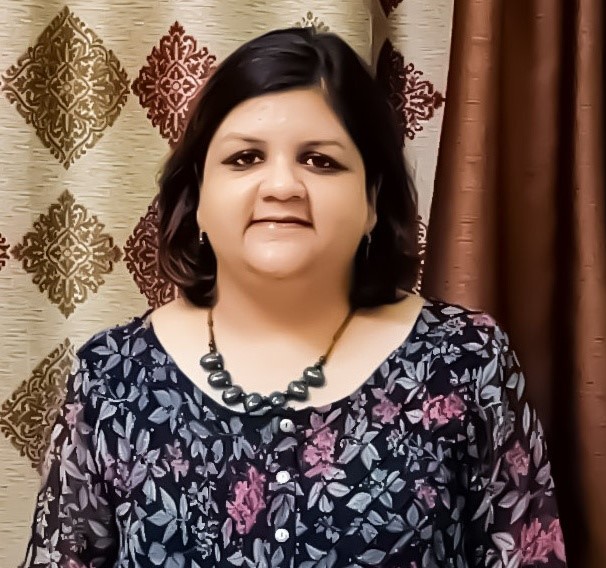Interview With Ruchira Garg, Author Of "Soda, Water, Lemon in my mocktail"
on Jul 01, 2022

Ruchira Garg was born in Varanasi and has lived across multiple cities in India. She is a psychology graduate from Lady Shriram College for Women and has a Master’s in Human Resources from Delhi School of Economics with a career spanning over two decades with renowned multinational brands.
She has been a speaker in several corporate and management events. She is also an active blogger and storyteller, sharing her thoughts on various professional forums as well as through her podcast which is available on all leading podcast platforms.
Along with her career in management, Ruchira is also an itinerant traveler. She finds travelling and engaging with people meditative and feels that her adventures help her build different perspectives. She shares her travelling experiences through her Travelog- “The Wanderbee”.
Soda, Water, Lemon In My Mocktail is her debut novel.
Frontlist: "Soda, Water, Lemon in My Mocktail" is a clever choice for the book's title. Why have you chosen these three ingredients to plot your storyline?
Ruchira: I started with the word Mocktail as I was looking for something one curates by mixing different flavors and yet it may not be exactly the way they envisaged it originally. The book is focused on how the protagonist leverages the different flavors that her experiences bring to make her own potion of life. The flavor of ‘Soda’ indicates quick decisions based on pre-conceived notions that may initially lead to a feeling of exhilaration as the bubbles rise but very soon fizzles out when reality bites. ‘Water’ brings out the sense of being molded in the shape others want one to and giving in without having an identity of one’s own and ‘lemon’ indicates the unpredictable sweet and sour moments that are important to give life its true taste.
Frontlist: How can women in our society relate to Mandira, the protagonist in your story, and how can she influence them?
Ruchira: Despite our society having evolved a lot over the years, there is still a huge segment of women who depend on the male members of their family to make decisions for them. They easily step into the unknown with complete dependance on their spouses like Mandira did. A majority do not deal with their own finances and completely defer that to others. There is also a high level of self-blame which restricts women from acknowledging and bringing out their challenges in the open and addressing them. I believe a lot of women in our society will relate to the experiences and challenges Mandira goes through and how she navigates through them will influence them to take charge of their lives too.
Frontlist: Is it difficult for a woman to be independent and successful while balancing it with the norms of life?
Ruchira: Many of the norms of our society were created to restrict women from being independent hence it is difficult as long as women let others dictate the norms for them. One can never make everyone happy. Our understanding of an independent and successful woman is very different from an independent & successful man. The erstwhile norms have laid out many additional barriers of responsibilities and behaviors on women than men. I would say we need to challenge the norms and make them more equitable instead of trying to balance an already skewed system.
Frontlist: In your book, you explore the difficulties that women must overcome in daily life. Why do men not need to make a choice when women constantly do?
Ruchira: When norms of society are one sided the choices will also be. As I mentioned the erstwhile norms were created to restrict the independence of women, so they have to exercise a choice to break the norms or adhere to them. These norms were not focused on men, so they do not have to make a choice. Yet in the times we live in we are experiencing a lot of men also making the choices and breaking norms. There are examples of role reversals or equitable distribution of responsibilities which were earlier only restricted to women as home makers, caregivers etc. But it is going to take a lot more time and conscious effort for the change to truly reflect in societal norms.
Frontlist: This book is dedicated to your parents. So, how did they inspire you? Could you share any such childhood memories.
Ruchira: My parents have always encouraged me to make choices and they have supported me through whatever the consequences of those choices. They have also always encouraged me to stand up for what is right. During my childhood, there was an instance when I and a few other students were being bullied by a school staff to pay money as a fine for coming in late. We had already been punished by being made to stand out and miss a class. When I came back home and asked my parents for the money to pay the fine, they encouraged to me to stand up and ask the staff to get an official letter for the same. Due to the values that they instilled in me I had the courage to walk up to the person the next day, challenge the fine and ask for an official communication for the same despite my friends trying to stop me and all others having paid the fine out of fear. Contrary to what everyone thought would happen due to my challenging him openly, instead of punishing me further, he quietly excused himself and from the next day he stopped bullying the students and collecting the fine.
Frontlist: In one of the chapters, we read how Mandira keeps her issues to herself. We see women doing the same in their daily life. Should women conceal these issues or look for a solution?
Ruchira: Many a times women conceal issues as they have a misguided notion of being responsible for everything that goes wrong. Some of this is triggered by the norms where women are brought up with a sense of being responsible to make everyone happy. What we forget is that if we are unhappy ourselves, we cannot spread cheer. A fruit that is rotting itself will rot the whole basket. It will not ripen other fruits and make them tastier. So, there is no point hiding the issues and living through misery as that will neither help them nor others. Asking for help is not a bad thing. That is the first step towards making the society a better place.
Frontlist: Knowing this is your debut novel, would you kindly share your writing process with us and any tips you have for aspiring authors?
Ruchira: As I was writing a book for the first time, I had to spend a lot of time building Mandira’s character in my mind. I did that through interacting with those whose stories inspired me to write this novel, other women who still conform to these norms and research on events of those days to recreate that period. There were a lot of questions which I had to answer in my mind thinking about how the reader of today will think to build a narrative. I focused on getting the story in the right flow, developing the characters further and thickening the plot with more incidents with every iteration. For a good read the language has to be good and crisp which was also a key focus. As I have learnt through interaction with readers, a well written and well edited book engages the reader a lot more than a new plot which is not well presented.



.jpg)






.jpg)

.jpg)
.jpg)
.jpg)

.jpg)
.jpg)










Sorry! No comment found for this post.